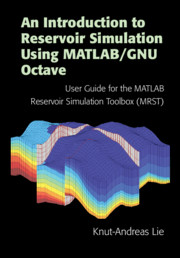 An Introduction to Reservoir Simulation Using MATLAB/GNU Octave
An Introduction to Reservoir Simulation Using MATLAB/GNU Octave Book contents
- Frontmatter
- Contents
- Preface
- 1 Introduction
- Part I Geological Models and Grids
- Part II Single-Phase Flow
- Part III Multiphase Flow
- Part IV Reservoir Engineering Workflows
- 13 Flow Diagnostics
- 14 Grid Coarsening
- 15 Upscaling Petrophysical Properties
- Appendix The MATLAB Reservoir Simulation Toolbox
- References
- Index
- Index
15 - Upscaling Petrophysical Properties
from Part IV - Reservoir Engineering Workflows
Published online by Cambridge University Press: 22 July 2019
- Frontmatter
- Contents
- Preface
- 1 Introduction
- Part I Geological Models and Grids
- Part II Single-Phase Flow
- Part III Multiphase Flow
- Part IV Reservoir Engineering Workflows
- 13 Flow Diagnostics
- 14 Grid Coarsening
- 15 Upscaling Petrophysical Properties
- Appendix The MATLAB Reservoir Simulation Toolbox
- References
- Index
- Index
Summary
One of the most challenging tasks in reservoir engineering is to homogenize data from a fine to a coarser model in a systematic and robust manner. This chapter reviews a variety of such upscaling methods. Simple averaging is sufficient for additive properties but only correct in special cases for nonadditive properties like permeability. The correct effective permeability depends on the applied flow field. In flow-based upscaling, one solves local flow problems with various types of boundary conditions to determine effective permeabilities or transmissibilities. We outline the most common methods, and discuss methods that reduce the influence of the prescribed boundary conditions by computing flow solutions on larger domains. Computations are achieved by imposing boundary conditions derived from a global flow solution. A number of cases compare the accuracy of different upscaling methods, and we discuss how flow diagnostics can be used for quality control. The last example summarizes major parts of the book by going all the way from geological horizons via flow simulation to upscaled models with flow diagnostics quality control.
Keywords
- Type
- Chapter
- Information
- An Introduction to Reservoir Simulation Using MATLAB/GNU OctaveUser Guide for the MATLAB Reservoir Simulation Toolbox (MRST), pp. 558 - 596Publisher: Cambridge University PressPrint publication year: 2019
- Creative Commons
- This content is Open Access and distributed under the terms of the Creative Commons Attribution licence CC-BY-NC-ND 4.0 https://creativecommons.org/cclicenses/
- 1
- Cited by


